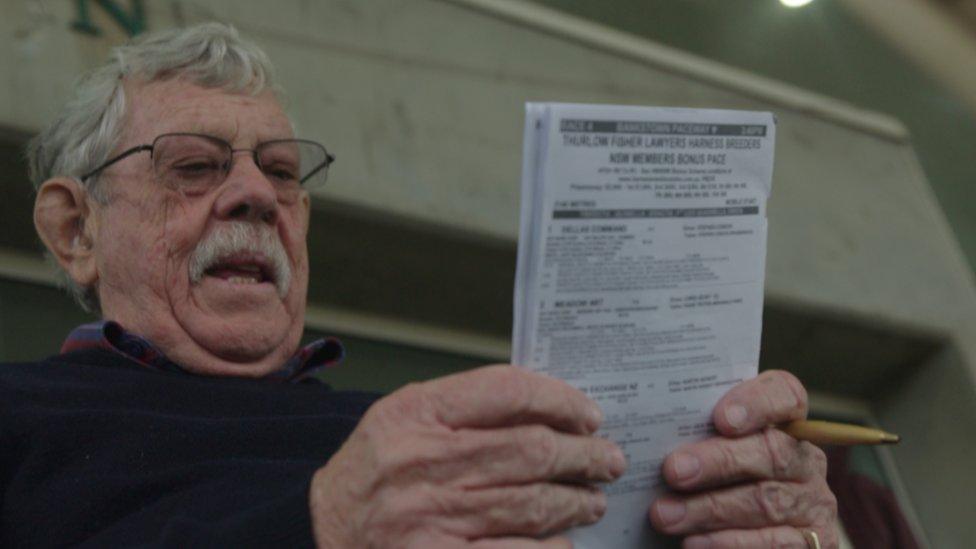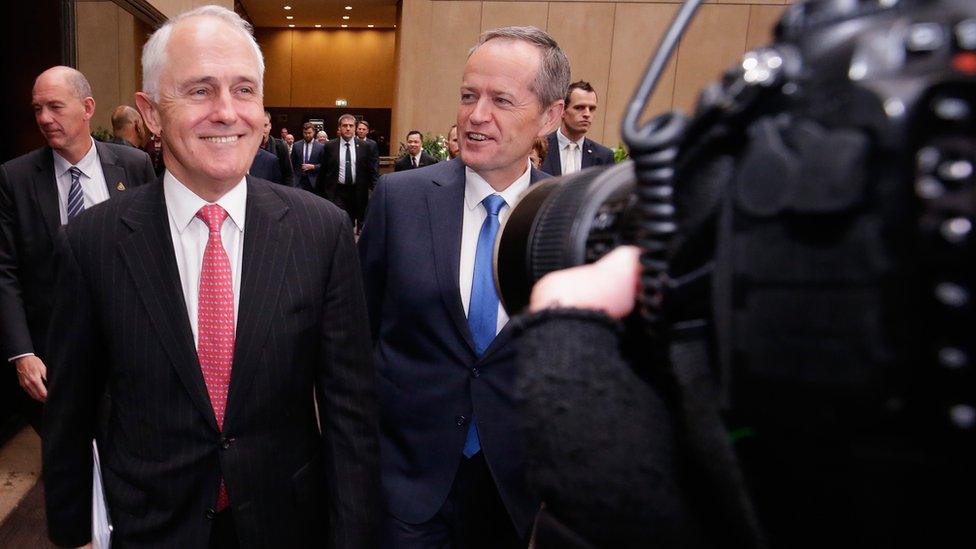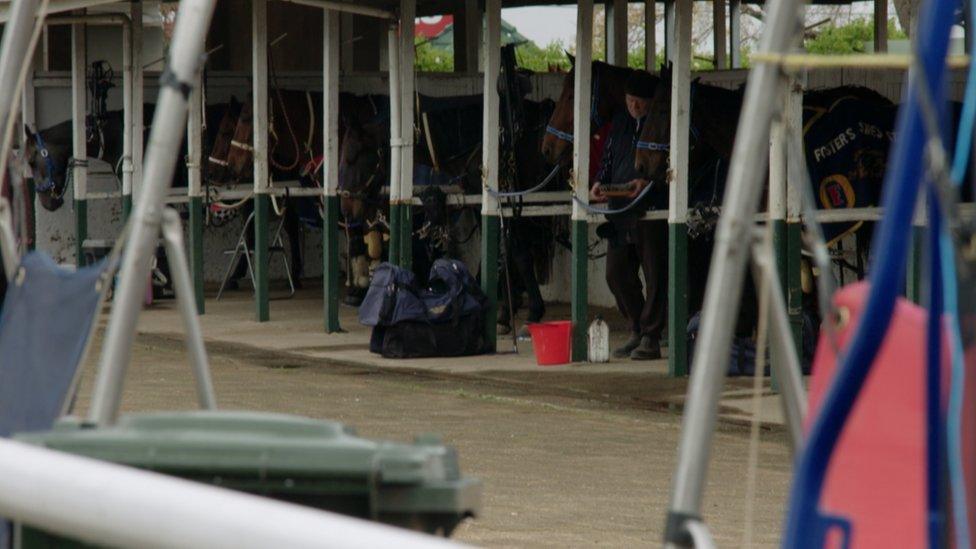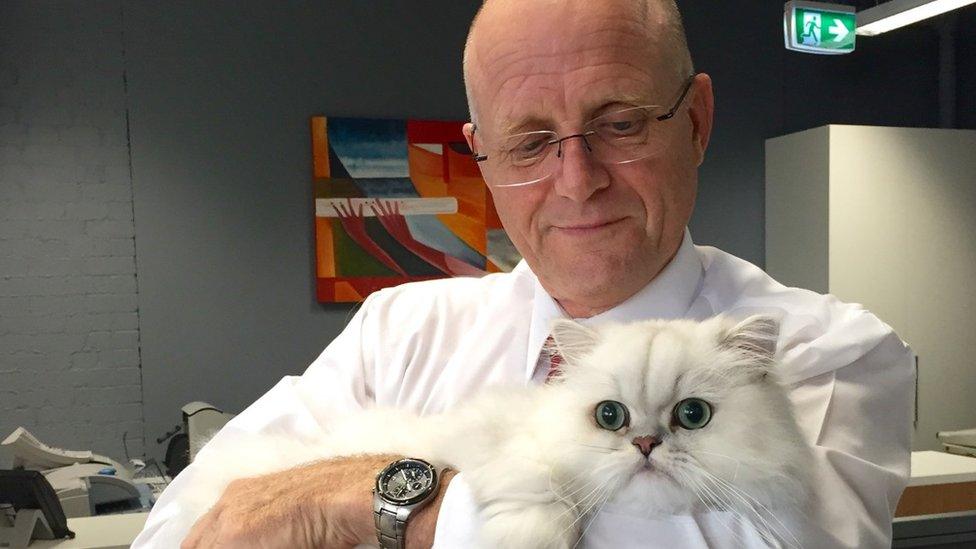Are Australians ready to gamble on yet another PM?
- Published
Six prime ministers in six years?
At Bankstown racecourse in Western Sydney, on a damp and drizzly winter's afternoon, there's a sparse but enthusiastic crowd.
They've turned out for a day of harness racing, a sport which is new to me but, despite the far from Romanesque setting, immediately conjures up images of Charlton Heston and Ben Hur, external.
Pies and pints in hand, most people are picking over their punts.
But on the eve of a federal election, a few are pondering politics.
"Personally I'm a swinging voter and at the moment I'd vote for anyone but the leading parties," one plain-speaking race-goer says. "I think our leaders are short on nuts."

With global uncertainty ahead of the Australian election, many voters are placing their bets cautiously
He goes on to say that the country needs "an Aussie Putin".
Not rolling the dice
Australians are famously the world's biggest gamblers, but with the global economic uncertainty caused by Brexit, many are feeling a little risk averse in the run up to this election.
"Everything is global these days," says Judy, a retired cook for whom the economy is one of the biggest election issues.
"Things that didn't hit Australia before are hitting Australia now."
And when I ask people what they're looking for out of this election, the most common answer is "stability."
"We've got to have a bit of stability," says Peter Clark, a retired horse trainer.
"We need strong, stable government. Not like we've had in the last few years."

Prime Minister Malcolm Turnbull and Opposition Leader Bill Shorten on the campaign trail
Revolving-door leadership
Indeed, for a supposedly stable democracy, Australian politics of late has been remarkably volatile.
The country has had an incredible five prime ministers in just six years (including two stints for Kevin Rudd).
The rate of change is only matched by perpetually crisis-ridden Greece.
The birthplace of democracy also managed five different leaders since 2010.
Australia, meanwhile, had to endure the back-and-forth soap opera of the Kevin Rudd/Julia Gillard years, where the two Labor leaders took turns to stab each other in the back.
In 2013, capitalising on Labor's internal squabbles, Tony Abbott led the conservative Liberal-National coalition to power.
But having pledged never to repeat Labor's mistakes, Mr Abbott fell victim to a leadership coup himself, being ousted after just two years by one of his Liberal Party colleagues, the current prime minister, Malcolm Turnbull.

After a series of prime ministers in the nation's top job, many Australians want stable leadership.
Mr Turnbull is a 61-year-old former lawyer who turned his hand to investment banking and became a multi-millionaire.
Unlike his more right-wing predecessor, Mr Abbott, he's regarded as a moderate conservative.
Outside Australia, Mr Turnbull is perhaps best known for having led the country's unsuccessful 1999 referendum campaign to ditch the monarchy and become a republic.
He is being challenged in this election by the Labor Party's Bill Shorten.
Despite lacklustre personal approval ratings, until a few days ago the 59-year-old former union leader looked like he had a strong chance of becoming Australia's sixth prime minister in six years.
His Labor Party had crept narrowly ahead in the polls.
Risks to economy
But that was before Brexit and the climate of global economic uncertainly that came with it.
"The conventional wisdom is that this favours the government led by Malcolm Turnbull," says Sam Roggeveen, a senior researcher with the Sydney-based think-tank, the Lowy Institute.
"In times of uncertainty people tend to stick with incumbents and his party (Mr Turnbull's) is traditionally aligned with strong, stable economic management in the eyes of voters."
Mr Roggeveen cautions that Mr Turnbull has not necessarily made the most of that trend in his final week on the campaign trail.
But post-Brexit polls show that Mr Turnbull has now edged ahead, external.
That said, in the week after Britain's EU referendum, many voters will be aware that the pollsters and pundits aren't always to be trusted.
"Opinion polls are less reliable than they used to be and certainly in the Brexit case the punditry was not to be relied upon," Mr Roggeveen says.
"If we're learned anything from Brexit and from recent Australian state elections, it is to expect the unexpected."
- Published28 June 2016

- Published27 June 2016

- Published30 June 2016
